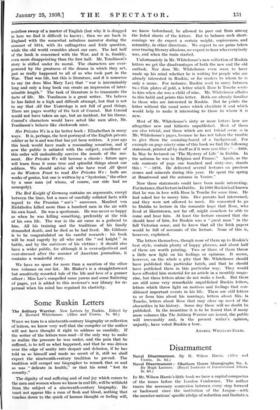Some Ruskin Letters
The Solitary Warrior. New Letters by Ruskin. Edited by J. Howard Whitehouse. (Allen and Unwin. 7s. 6d.)
WHEN we turn to a nineteenth-century biography or collection of letters, we know very well that the compiler or the author will not have thought it right to address us candidly. If the writer of the letters runs mad—if the only way to make us realize the pressure he was under, and the pain that he suffered, is to tell us what happened, and that he was driven over the edge of sanity into despair and delusion, if he has told us so himself and made no secret of it, still we shall expect the nineteenth-century tradition to prevail. The tradition will compel our biographer to remark that so and so was " delicate in health," or that his mind " lost its serenity."
The dignity of real suffering and of real joy which comes to the men and women whom we know in real life, will be withheld from the subject of a nineteenth-century biography. He must not appear like a man of flesh and blood, nothing that touches down to the quick of human thought or feeling will, we know beforehand, be allowed to peer out from among the faded sheets of the letters. But to balance such short- comings we do expect a certain weight, copiousness, and rotundity, in other directions. We expect to see pains taken over tracing literary allusions, we expect to hear who everybody was, and when the train started.
Unfortunately in Mr. Whitehouse's new collection of Ruskin letters we get the disadvantages of both the new and the old outlook. Nor does Mr. Whitehouse even seem to have made up his mind whether he is writing for people who are already interested in Ruskin, or for readers to whom he is only a name. For instance, Ruskin used to carry between two thin plates of gold, a letter which Rose la Touche wrote to him when she was a child of nine. Mr. Whitehouse alludes to this habit and prints this letter. Both are already familiar to those who are interested in Ruskin. But he prints the letter without the usual notes which elucidate it and which would help to make it interesting to those to whom it is new.
Most of Mr. Whitehouse's sixty or more letters here arc altogether new and hitherto unpublished. Most of them are also trivial, and those which are not trivial seem ro in Mr. Whitehouse's pages, because he has not taken the trouble to give them the sounding-board of a background. For example on page ninety-nine of this book we find the following statement, printed all by itself as if it were vers litre :" —1868. In May he lectured on 'The Mystery of Life' in Dublin. In the autumn he was in Belgium and France." Again, as the sole contents of page one hundred and sixty-one, stands this : " —1876. He delivered several lectures on precious stones and minerals during this year. He spent the spring at Brantwood and the autumn in Venice."
Now these statements could have been made interesting. For instance, that lecture in Dublin. In 1868 Ruskin laid known that he was in love with Rose la Touche for some time. He had asked her to marry him. Her parents had intervened, and they were not allowed to meet. He consented to go to Dublin to lecture in the romantic hope that Rose, who lived at Harristown, not far off, might somehow be able to come and hear him. At least the lecture ensured that she should hear of him, for Ruskin was a " great man " in the full Victorian sense, and he knew that all the Irish papers would be full of accounts of the lecture. None of this is, however, explained.
The letters themselves, though none of them up to Ruskin's best style, contain plenty of happy phrases, and about half of them are worth printing. Two or three of them throw a little new light on his feelings or opinions. It seems, however, on the whole a pity that Mr. Whitehouse should have published this particular batch, and that he should have published them in this particular way. They would have afforded him material for an article in a monthly maga- zine, but these letters alone do not make a book. But there are still some very remarkable unpublished Ruskin letters, letters which throw light on motives and feelings that con- ditioned important events in his life. There are still letters to or from him about his marriage, letters about Mrs. In Touche, letters about Rose that may clear up most of the obscurities in his history. Some day these will no doubt be published. In the meantime it is to be feared that if many more volumes like The Solitary Warrior arc issued, the public will irrevocably and, in the present writer's opinion, unjustly, have voted Ruskin a bore.
ASIABEL WILLIAMS-ELLIS.






































 Previous page
Previous page